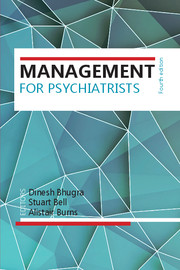Book contents
- Frontmatter
- Contents
- List of contributors
- List of figures, tables and boxes
- Preface
- Part I Theoretical overview
- Part II Changes and conflicts
- Part III Personal development
- 26 Compassionate care: leading and caring for staff of mental health services and the moral architecture of healthcare organisations
- 27 How to manage committees: running effective meetings
- 28 Presentation skills
- 29 Time management
- 30 Developing effective leaders in the National Health Service
- 31 Mental health informatics
- 32 Stress, burnout and engagement in mental health services
- 33 How to get the job you really want
- 34 Surviving as a junior consultant: hit the ground walking
- 35 Working with the media – many benefits but some risks
- 36 Consultant mentoring and mentoring consultants
- Index
36 - Consultant mentoring and mentoring consultants
from Part III - Personal development
Published online by Cambridge University Press: 02 January 2018
- Frontmatter
- Contents
- List of contributors
- List of figures, tables and boxes
- Preface
- Part I Theoretical overview
- Part II Changes and conflicts
- Part III Personal development
- 26 Compassionate care: leading and caring for staff of mental health services and the moral architecture of healthcare organisations
- 27 How to manage committees: running effective meetings
- 28 Presentation skills
- 29 Time management
- 30 Developing effective leaders in the National Health Service
- 31 Mental health informatics
- 32 Stress, burnout and engagement in mental health services
- 33 How to get the job you really want
- 34 Surviving as a junior consultant: hit the ground walking
- 35 Working with the media – many benefits but some risks
- 36 Consultant mentoring and mentoring consultants
- Index
Summary
What is mentoring?
Surprisingly, at a time when the evidence base for clinical practice has never been so eagerly sought after within the NHS, an approach to continuing professional development has emerged which seems to be not susceptible to measurement and to be subject to a wide variety of definitions.
The concept of ‘mentoring’ has been interpreted across a continuum from a remedial or therapeutic intervention to ‘buddying’ and the entirely informal. Specific benefits are hard to identify within the available literature. However, Rodenhauser et al (2000) do refer to the kind of outcomes that can be obtained from the process:
‘guidance with socialisation into the profession, assistance with stresses along the way, help with the choice and fulfilment of a career path and inspiration for meaningful involvement in activities such as research and administration.’
However difficult it is to measure the benefits of mentoring in a quantifiable way, there has nonetheless emerged, over the last decade, a consensus among the healthcare community that the encouragement of mentoring schemes is good practice and adds value.
The trend in recent years to hold professionals to account for their practice has seen the adoption of a number of management innovations. In the NHS, the development of appraisal schemes, often associated with discretionary awards, has become universal. Similarly, together with appraisal, coaching schemes, mentoring programmes and similar interpersonal development initiatives for hospital doctors have become increasingly common. Statutory revalidation, while independent of such developmental initiatives, has nonetheless added to the idea that clinical practice requires ongoing reflection and assessment.
A consensus has emerged around the definition of mentoring produced by the Standing Committee on Postgraduate Medical Education of the British Medical Association (BMA):
‘[mentoring is] the process whereby an experienced, highly regarded empathic person [the mentor], guides another individual [the mentee] in the development and re-examination of their own ideas, learning and personal and professional development. The mentor, who often, but not necessarily, works in the same organisation or field as the mentee, achieves this by listening and talking in confidence to the mentee.’ (Oxley, 1998: p. 1)
Not surprisingly, there are a variety of other definitions which have more or less congruence with this approach.
- Type
- Chapter
- Information
- Management for Psychiatrists , pp. 503 - 512Publisher: Royal College of PsychiatristsPrint publication year: 2016



